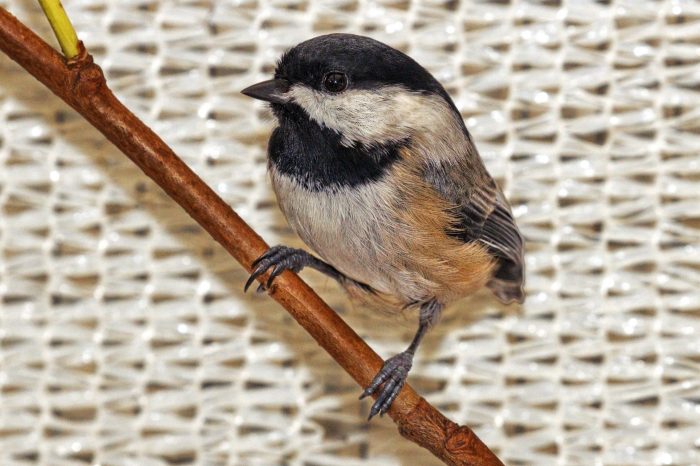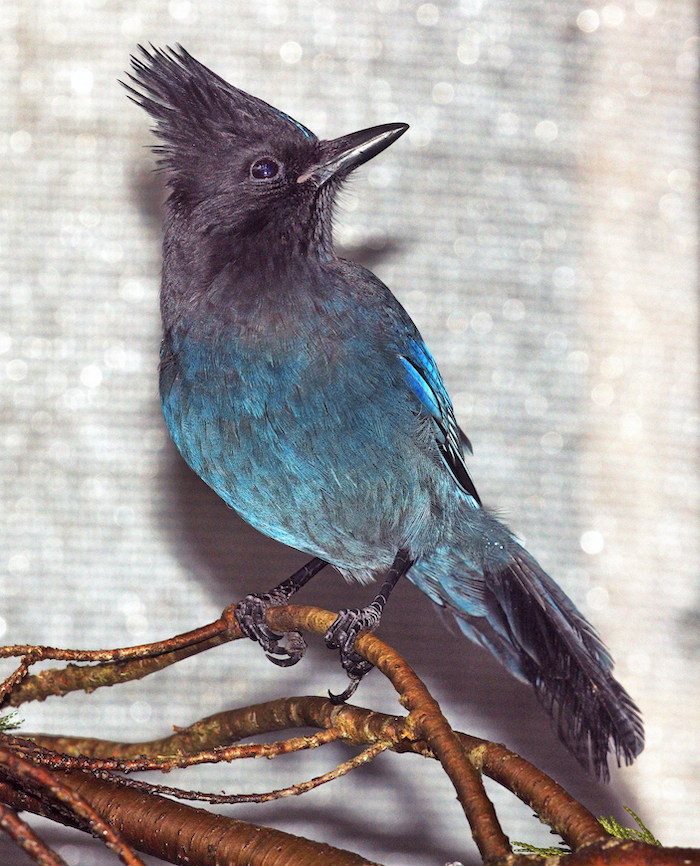Support Us
Since 1979 more than 140,000 animals have been treated by Wildlife Rescue.
Thanks to the support of individuals like you, Wildlife Rescue can provide a lifeline for animals in distress.
Every year, Wildlife Rescue provides care to hundreds of wildlife impacted by glue traps and flypaper. These inhumane methods to prevent unwanted guests inside and outside our homes cause horrific injuries and sometimes death to vulnerable wildlife.

A Black-Capped Chickadee that recently came in stuck to a glue-trap.
Glue traps are trays that are coated with sticky adhesive and are used to catch small mammals, insects, birds, snakes and even small birds of prey. Flypaper is like glue traps but trap birds and bats to the tape seeking insects and make it impossible to get free. Out of the various methods of animal removal, glue traps are the most inhumane as the glue trap itself does not kill the animal – instead, the animal dies slowly and painfully of starvation and dehydration, tearing at its fur, feathers, and limbs to escape. Not only is this trap cruel, but it can catch wandering wildlife and even domestic pets.
When placed outside, glue traps will initially attract insects and other pests, animals that eat insects will be attracted to the insects struggling on the trap and become stuck themselves or the glue trap will become stuck to the animal if they are large enough to walk away.
The traps result in horrific injuries for any wildlife that becomes ensnared, as the adhesive rips and tears the animals’ skin, fur, or feathers. The trapped wildlife will then suffer further injuries as they desperately try to escape the trap by scratching or biting at their own body.
An example of the damage, glue traps can do to an animal, imagine a small bird. It gets its foot stuck in the glue trap. The best result will be that the surface skin of its foot comes off, and it can hop on its good foot to some shrubs. If this happens, the bird’s foot can get infected and it is vulnerable to predators as it hops away. However most likely the bird will use its beak to try to remove the glue trap and get other parts of its body trapped causing further damage.
If the animal is simply removed the glue will stay on their skin or feathers, causing irritation, ingestion, inability to regulate heat and possibly get stuck to another surface. Do not cut fur or feathers as the animal depends on these to survive and will not simply just grow them back from the trimmed location. It is important to bring the animal to a rescue centre immediately while still attached to the glue trap so the experienced staff can remove the animal safely. Improper removal can cause lacerations, fractures, or important feather structures may be broken causing potential death. Simply place a box, or ventilated non-transparent piece of plastic recycling on top of the animal to create a dark safe space for the animal, so they cannot struggle further and they feel safe.

A Steller’s Jay that was found with it’s tail covered in a sticky-substance, likely from a glue-trap.
Go Ethical!
Thankfully, there are ethical preventative measures available to protect your home from pests. Rodents are attracted to spaces that have both food and shelter available to them – so removing yard debris, trash, sealing all openings around the house are great ways to prevent pests from coming into the home in the first place. If pests are already in your home or space there are many humane methods to persuade them to leave before killing them, once you are sure they are gone sealing up any entry points and removing their sheltered spaces will help prevent them from returning.
Of course, eliminating possible food sources will help keep the nuisance animals away. You can do this by picking up fallen fruit, cleaning under any bird feeders, keeping bulk pet food in secure containers, feeding your pets indoors and securing your garbage, compost and recycling are another easy way to make sure your home is not attractive for rodents.
In the case that you do have an unwanted guest in your home, calling a humane pest control company is the best way to make sure both you and your guest stay safe. The BC SPCA has an animal welfare accreditation program called “AnimalKind” that focuses on humane solutions for removing animals. If the unwanted guest is a protected wild animal, please look at the BC SPCA website or call our support centre for advice.
If you see wildlife in distress please contact our Support Centre for assistance.